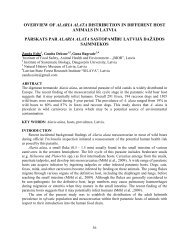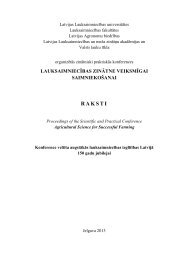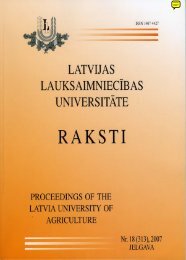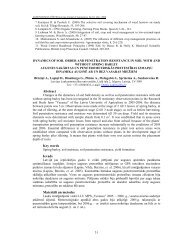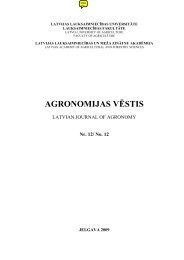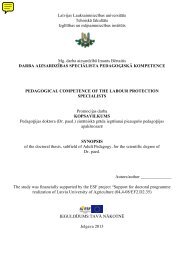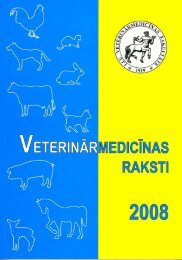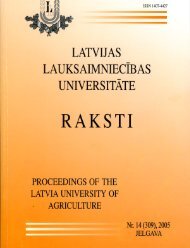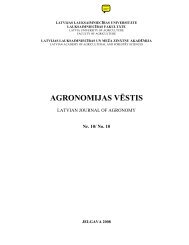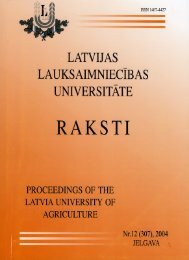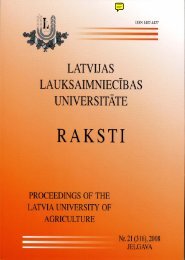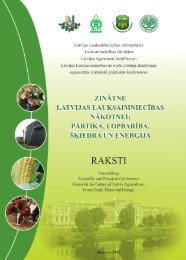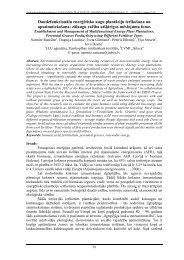Latvia University of Agriculture - Latvijas Lauksaimniecības ...
Latvia University of Agriculture - Latvijas Lauksaimniecības ...
Latvia University of Agriculture - Latvijas Lauksaimniecības ...
Create successful ePaper yourself
Turn your PDF publications into a flip-book with our unique Google optimized e-Paper software.
Z. Gaile Development <strong>of</strong> the Research and Study Farm “Vecauce”Weed control problems were studied for integrated pest management system as wellas for organic farming. J. Kopmanis, under guidance <strong>of</strong> Dr.agr. M. Ausmane, carriedout a research on weed control problems for earning his Dr.agr. degree – “Effect <strong>of</strong>reduced herbicide dosage on weediness <strong>of</strong> spring barley and on next generation <strong>of</strong>weeds”. The research included investigation <strong>of</strong> reduced dosage (treatments – controlwithout herbicide use, 1/1, ½, and ¼ from the registered dose) effect on weed control<strong>of</strong> six widely used herbicides for spring barley. Based on adopted herbicide efficiencyfor different weed species control, prototypes <strong>of</strong> “PC-P Weeds” (originally created inDenmark) computer program for <strong>Latvia</strong> was made, and the next generation <strong>of</strong> sprayedwith-reduced-herbicide-dosesChenopodium album was studied according to possibleresistance development (Kopmanis, 2005). In 2004, Dr.agr. M. Ausmane started to studyweed control problems in organic crop rotation after certification <strong>of</strong> the organic researchfield and establishment <strong>of</strong> crop rotation. The research demonstrated that crop rotationreasonable in organic farming system is one <strong>of</strong> tools for weed control thanks to differentcultivation technologies that are used for different crops. Crop species diversity andcrop diversity according to utilization in rotation can control spread <strong>of</strong> weed seeds. ForElytrigia repens, special agro-technical methods should be used, but annual and biennialweeds can be effectively controlled by harrowing (Ausmane et al., 2007).Currently investigations <strong>of</strong> field crop management are carried out in precisionfarming under guidance <strong>of</strong> Dr.agr. D. Lapiņš. For this purpose, several production fieldsare used; the main winter crops investigated are wheat, barley, and oil-seed rape. In theinvestigations two doctoral students are participating and carrying out their research forearning their Dr.agr. degree.The researchers from the Plant Protection Department (Dr.habil.agr. I. Turka andDr.biol. B. Bankina) carried out part <strong>of</strong> research for the international project “Developmentand implementation <strong>of</strong> an Internet-based decision support system for integrated pestmanagement in <strong>Latvia</strong>”, subsections NegFry (connected with Phytophthora infestans)and “PC-P Diseases” (connected with winter wheat diseases) (1999-2002). Both modelslike “PC-P Weeds” were created in Denmark. The main conclusion was that use <strong>of</strong> theprograms can decrease the number <strong>of</strong> sprayings or the total amount <strong>of</strong> used pesticides.Within this project, G. Bim teine under guidance <strong>of</strong> Dr.habil.agr. I. Turka carried out aresearch with field trials for earning her Dr.agr. degree – “Inventory <strong>of</strong> Phytophthorainfestans population and optimisation <strong>of</strong> computer models for forecasting” (Bim teine,2005).Since 2006, oilseed rape including incidence and severity <strong>of</strong> the diseases has beenstudied. Particularly attention has been paid to rape Phoma stem canker (Leptosphaeriassp.). Development cycle <strong>of</strong> disease and diagnostics <strong>of</strong> two agents (Lepthospaeriamaculans and L. biglobosa) in <strong>Latvia</strong> has been studied (Bankina et al., 2008). Theresearch on disease control <strong>of</strong> oilseed rape is being continued, and also control <strong>of</strong> cerealdiseases for integrated pest management is currently being studied.The Department <strong>of</strong> Plant Biology has not carried out big-scale experiments in“Vecauce”. Some demonstrations <strong>of</strong> the efficiency <strong>of</strong> nitrogen fixing bacteria usefor Galega orientalis and lucerne have been performed under guidance <strong>of</strong> pr<strong>of</strong>essorV. Klāsens. Demonstrations clearly showed necessity to use nitrogen fixing bacteria,especially for new or seldom grown crops (such as Galega orientalis) due to non-being<strong>of</strong> specific bacteria in soil. Also the Department <strong>of</strong> Horticulture has not extensively madeuse <strong>of</strong> the “Vecauce” orchards for research. Some bachelor studies have been carried outthere. For example, a very nice project was realised for the exhibition “Vecauce-2004”– arrangement <strong>of</strong> a small garden <strong>of</strong> spices and vulnerary and ornamental plants. Thegarden is being renovated and rebuilt in 2009.The Department <strong>of</strong> Soil Science and Agrochemistry made use <strong>of</strong> the “Vecauce”facilities infrequently. Three standard pr<strong>of</strong>iles <strong>of</strong> the “Vecauce” soils were described in2002, and the results <strong>of</strong> two descriptions were included into the newly published (2009)“Taxonomy <strong>of</strong> <strong>Latvia</strong> Soils” (in <strong>Latvia</strong>n “<strong>Latvijas</strong> augšņu noteicējs”) edited by pr<strong>of</strong>essorA. Kārkliņš. In 2007, Dr.agr. R. Vucāns arranged a couple <strong>of</strong> field trials in order to developa new method <strong>of</strong> phosphorus detection in soils; in 2008, Dr.agr. I. Līpenīte studied use<strong>of</strong> dairy cow manure as a substrate for biogas production, and use <strong>of</strong> digested substratefor fertilization <strong>of</strong> field crops.Investigation into different topics connected with oilseed rape was started in 2006.The growing manner <strong>of</strong> winter oilseed rape has been studied by surveying 15 farms inZemgale. Field trials have been arranged in “Vecauce” for testing the efficiency <strong>of</strong> foliar<strong>Latvia</strong> <strong>University</strong> <strong>of</strong> <strong>Agriculture</strong> – 70, 2009 139



